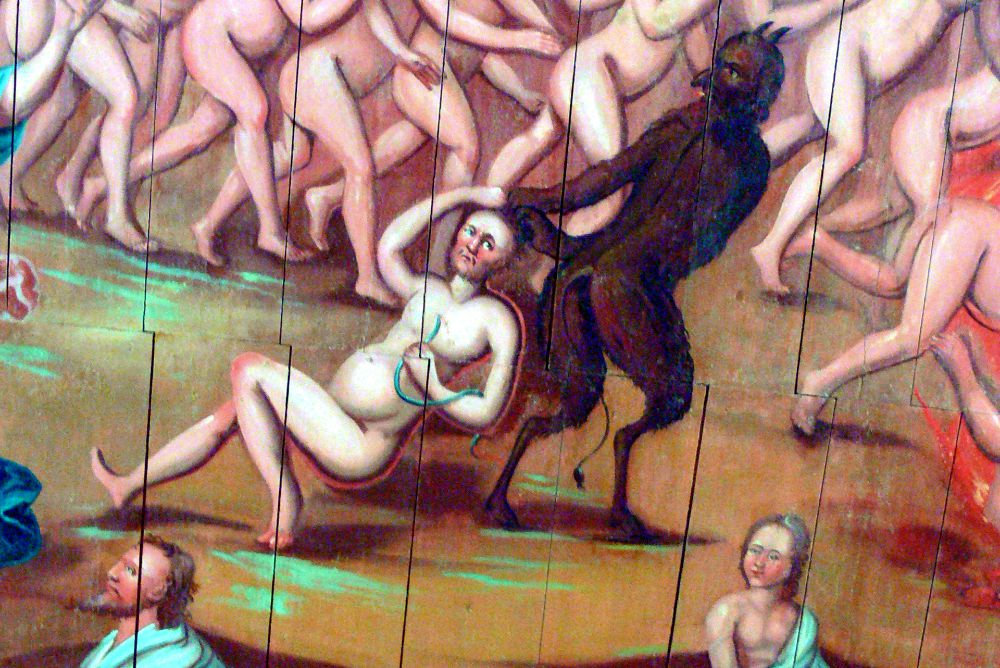
Detail of ceiling of 18th-century Møgeltønder Church in Denmark, showing a painting of the Last Judgment (Wikimedia Commons/ Wolfgang Sauber)
Happy Advent!! This holy season of preparation and expectancy began yesterday and will end with the Vigil Mass of Christmas.
For several years now, I have been fretting about the disappearance of this holy season. People laugh when I say that I am "religious but not spiritual," even though it is true in my case, but one of the most spiritually powerful columns I ever wrote, back in 2013, was entitled "The War on Advent." Two years ago, in the afterlight of the disastrous election results, I returned to the theme with a column called "Trump and the 'War on Christmas.' "
I just reread those columns, and they have held up pretty well so I commend them to you if you have never read them.
I would like to pick up on one of the themes of many Advent hymns: dread.
In "Hark! A Thrilling Voice is Sounding," the first verse urges all to "cast off works of darkness," the second verse speaks of "solemn warning," the third describes "tears of sorrow," and the fourth explains that Christ will wrap "all the world in fear."
Nothing jolly about that!!!
My all-time favorite Advent hymn is "Lo, He Comes with Clouds Descending." (I have dared several bishops to use this as an entrance hymn at their installations but, oddly, none have taken me up on it.) The second verse speaks of "deeply wailing, deeply wailing," while the third repeats, "Come to judgment, come to judgment." Again, the tone is not just serious but dire. It is the second coming that is being conjured. Think of the "dies irae" in the requiem.
Where did that emphasis on the second coming go? It is in the readings, but when was the last time you heard a really good sermon on the second coming, at this time of the year or anytime of the year?
Last week, Bishop Daniel Flores posted Giotto's mural of "The Last Judgment" with a provocative quote from Romano Guardini on his Twitter account:
He quotes Romano Guardini: "When one speaks of [the Final Judgment] it is usually as of something dreadful. In reality, the judgment is a testimony of honor for man, for it places him in a position of responsibility. Only a free and responsible being can be judged."
I worry about saying such a thing in our pelagianistic American church. Obviously, the good bishop, to say nothing of Guardini, is holier than I am, and so the idea of being judged is not as dreadful to him as it is to me. I suspect more people are like me than like Bishop Danny.
Sin is the most obvious consequence of our freedom and responsibility, and with sin comes death. If you don't have time to make an Advent wreath, if you are not moved by Advent carols, if you simply have too much preparation to do for the externalities of Christmas that you have no time to prepare spiritually, do this one thing: Go to confession. Make an examination of conscience. Focus on your sins. Recognize how badly you need a savior.
The bishop's tweet also called to mind the beautiful thing the Holy Father said at last week's general audience, when the young autistic boy scrambled on to the stage at the Paul VI audience hall, and roamed around the stage as if nothing important was going on. Instead of scolding the boy, the pope rolled with the punches; but later, when he was offering his reflections, he said of the episode, "It made me think, am I also free like that before God?" The pope recalled that Jesus had told us we have to be like little children. Think of how the dominant, commercial culture makes us slaves in this season, and teaches the little children to become slaves as well.
Advertisement
The ambiguity with which we hear Guardini's words, however, points to one of the core ambiguities of the season. We are waiting for a savior, but we know how the story ends: The savior came. Attending to the second coming, then, creates the sense of expectancy that we believe God's people Israel had some two thousand years ago.
Here is the thing, and it is the thing that I think Pope Francis is trying to tell us, the central theme of his pontificate actually and, in a different way, the central focus of Pope Benedict XVI's pontificate as well. In faith, we believe Jesus came to redeem the world, once and for all, some 2,000 years ago. In faith, we believe that Jesus will come at the end of time to judge the living and the dead. We affirm these beliefs in the Nicene Creed every Sunday. But Jesus is also coming today, right now, whenever we are confronted with human need, whenever we contemplate the reserved Eucharist, whenever we partake of the sacraments, whenever we acknowledge our own sins, whenever we seize the opportunity to act kindly or to forgive. This Advent, in contemplating the first and the second comings, perhaps our goal should be to focus on all the millions and billions of comings between the two, to see Jesus alive, here and now, still and always a savior, our savior, the savior of the world.
[Michael Sean Winters covers the nexus of religion and politics for NCR.]
Editor's note: Don't miss out on Michael Sean Winters' latest: Sign up to receive free newsletters and we'll notify you when he publishes new Distinctly Catholic columns.








